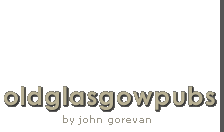Saltmarket.
25 Pubs found.Athole Tavern. 116
Bailie Nicol Jarvie. 68
Bank Tavern.18
Boot Tavern. 39
Concert Rooms. 46
Coogan's, Coat of Arms. 11
Globe Tavern.18
Graham's Bar. 37-45
Jupiter Tavern.46
Musical Tavern. 36
Nightingale Tavern. 28
O'Brien's. 37-45
Odd Fellows.31
Old Boot. 78
Old Empire Bar. 68
Old Ship Bank. 166
Scotch Grey Tavern.18
Shakespeare Tavern. 36
The Singing Saloons.
Sir Walter Scott Tavern.28
The Sun Tavern. 19
Tolbooth the. 11
The Three Tuns Tavern. 18
The Union Tavern.103
The Waverley Tavern.18
The Glasgow Corporation which had been subject to fierce criticism than the Improvement Trust. That much of that criticism was justified will be admitted by all those who have watched its vacillating and eccentric policy. What could be more insane, we might almost say suicidal, than its attitude towards the licensed trade? With a ruthless hand, without regard to vested interests or anything else, it has deprived men and women, who had been in business for years, of the only means of livelihood at their disposal, without compensation, or displaying the slightest courtesy to the holders in turning them adrift.
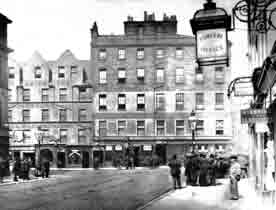
Saltmarket from London Street.
There is only one redeeming feature about this action of the Trust, however, which cannot be overlooked, and that is the splendid work it has accomplished in pulling down the rookeries in the central district in the city. For close on a century this was par excellence the Alsatia of crime in Scotland. After the re-construction of the Saltmarket and its neighbouring tributaries, once the haunts of every species of the genus lawbreaker, is now one of the most respected localities in the city. Shops, which will bear favourable comparison with any in our most fashionable thoroughfares, have sprung up in every direction, and in a century a restaurant and bakery establishment has been planted in the very heart of the Saltmarket which would do credit to Sauchiehall Street. This old founded business was conducted by John Adam and opened up again a few months after the completion of the new Saltmarket. This was a respectable establishment, there were eight large well upholstered rooms and dinners and teas were of the best quality money could buy. Mr Adam was a thoroughly practical man and had been identified with the trade most of his life. The old eating house was rapidly disappearing in Glasgow at the time.
Images of the Closes in Saltmarket.
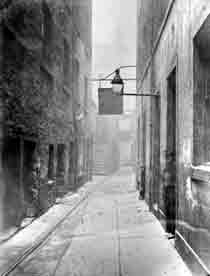
Number 18 Saltmarket houses five notorious taverns, the Three Tuns, The Waverley, Scotch Grey, Globe Tavern and the Bank. 1868. The landlord of the Three Tun's Tavern was honest John Greig a character in his one way, and the same may be said of John Neilston the Boniface of the Boot.
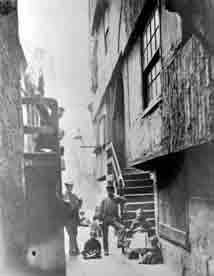
Number 28 Saltmarket houses the Nightingale Tavern and Sir Walter Scott's Tavern. Image taken in 1868.
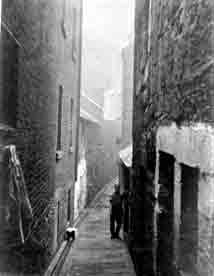
Number 31 Saltmarket houses the Odd Fellows Tavern. 1868.
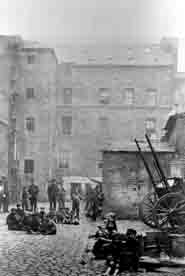
Number 46 Saltmarket. Houses the Jupiter Tavern and the Concert Rooms. In this back court children and adults pose for the camera man.
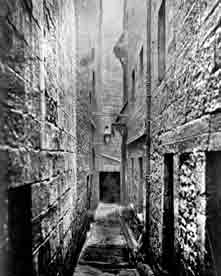
Number 61 Saltmarket. 1868.
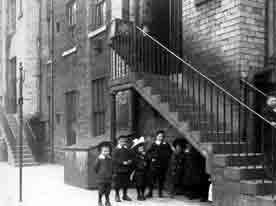
Number 67-143 Saltmarket. The children in this image are very well dressed with their Sunday Best. The Union Tavern would have be nearby.
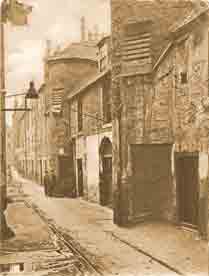
This old postcard at Number 139 Saltmarket.
Daniel Defoe's Visit to Glasgow in 1707
Daniel Defoe (1659-1731) is best known as the author of Robinson Crusoe and one of the greats of early English novel writing. However, he was also a political intriguer and agent of the English government, whose activities in Scotland in 1706 to 1707 helped secure support for the union with England.
An ungrateful government failed to reward Defoe for his services, but the writer used his experiences in writing A tour thro' the Whole Island of Great Britain. Published in three volumes between 1724-27, it is a detailed account of visits to various cities and small towns in the years before the Industrial Revolution.
During Daniel Defoe's stay in Glasgow, London Road did not exist at Glasgow Cross, the Saltmarket came up to join the Gallowgate. At just about that spot there was an inn, one of the very many in that area. In the late days of the eighteenth and the opening of the nineteenth centuries drinking in Glasgow was divided by classes. If you were a well-to-do merchant or shopkeeper or university professor you went to certain hostelries where you drank claret and punch and whisky. Claret, of course, was the great drink, and horse-drawn vehicles paraded around Glasgow selling claret by the jug or bowl to housewives who wanted to keep their husbands happy.
Claret kept its popularity by reason of "Auld Alliance " between Scotland and France, Punch was popular because so many Glasgow merchants had an interest in America and the West Indies, so they imported their own rum and their own limes. Bailie Nicol Jarvie attributed to success of his own particular punch to the fact that the limes were grown on his plantation. And whisky was popular because it was cheap, being home-made, and very, very strong.
These things were for the well-off people and Glasgow then was sharply divided between the rich and the poor. If you were poor and went into an inn and had to count your pennies. The usual thing was a group of three or four men to go in together and buy a bowl of ale. They would sir round a table and pass the bowl of ale from one to another, much as a loving cup is passed round at a university dinner today.
It they had a little money they might buy a bottle of whisky and share it in the same way. This was a chancy business, though, because bottles varied so much in size. The Inn at the corner of the Saltmarket was kept by an Irishman. It was patronised mainly by the poor people and the Irishman's soft heart was disturbed by the sight of a group of men sharing a bowl of ale or a bottle of whisky. All of a sudden the answer came to him: Why should he not serve the mercies in smaller measures?
And so he contrived to get small containers for the ale, and even smaller containers for the whisky. Each man now could order for himself a small measure of whisky and a somewhat larger measure of ale. And so Glasgow gave its inestimable gift to the world- "Hauf an" the Hauf-pint." That is to say, the half-measure of whisky, followed and washed down by the half pint of ale. For many years it was regarded locally as the quickest way in the world to get drunk. Such are the benefits of science that some Glaswegian know quicker ways now.
In some parts of Glasgow, whisky was thought to be far too expensive, and it was also rejected because it had become swanky. It was found that you get pretty much the same effect (and the devoted drink for effect, and not for taste) by drinking a glass of cheap wine and following it with a "Chaser" of beer. Pubs which sell this combination are known in Glasgow as a "Wine Shop." They are not notable for their amenities, but their quick service could hardly be quicker.
One morning I went into a wine shop near the centre of the city. The opening hour was eleven, and I was, maybe, some ten minutes late. I entered a small outer room which was the public bar. On the gantry were enamel trays in great profusion, and each enamel tray was laden with glasses of cheap wine, already poured out. The staff stood ready at the beer machines to provide the accompaniment.
Already, in a number of back parlours, the addicts were at it. Any moment now they were going to reach the singing stage. I could only conclude that, since it was shortly after official opening times they had been drinking all night.
This sounds dreadful, but I must point out that there are very few wine shops in the city. Some psychologist think they serve a useful need. One chargehand of a wine shop told me that on Friday and Saturday nights women with fur coats and "Kelvinside" accents arrive at opening time and leave, in taxis, at closing time. "Did you see that picture The Snake Pit?" he asked me. "it's not in it with this place on a Saturday night!"
In Daniel Defoe's day they drank heavily in Glasgow, but they didn't know of later refinements. Some two hundred years after Defoe, in the days of the depression, the early thirties, there were two drinks known as Jake and Red Biddy. These were mixtures of methylated spirits and cheap wine. The effect on the addict was frightening. I have seen Red Biddy drinkers brought into the Central Police Station in Glasgow and slid, literally rigid, from the Black Maria into the cell.
In those days in Glasgow, the chief object of the down-and-out was to achieve oblivion. One way was to attach a tube to the gas bracket on the stair landing to the tenement and send a whiff of gas into a glass of milk. Mind you, while this was certainly done, it was not general. It achieved fame because of newspaper reports that I might describe as picturesque.
Scent-drinking was fairly popular, though very much an acquired taste. Any cheap scent would do, but at one time there was an Eau de Cologne, or so it said on the label on the bottle, which sold at sixpence and it was a great favourite.
Experts on oblivion told me that between the wars it was possible to be drunk for a fortnight on less than a shilling. In those days an oblivious addict could buy six-pence-worth of spirit of salts from any chemist. That is forbidden now. He also bought a large bottle of lemonade, which cost about fivepence. Into the bottom of a glass he put a very little spirit of salts, and filled it up with lemonade. When he swallowed this mixture he became unconscious almost immediately.
As soon as he came back to his detested life, and that might take some time, depending on the strength of the original mixture, he took a glass of water. The effect of the water on his interior made him drunk again. Next time he recovered he took another drink of water and left the world. He just kept on drinking water until it no longer had the effect. Then he made a new mixture of spirit of salts and lemonade and started it all over again. And by ringing the liquid changes in this way he would remain drunk for two weeks.
This kind of dreadful drinking hardly exists in Glasgow now. The much-criticised younger generation go in for vodka and Bacardi rum, chased down by Scandinavian beers. But the real Glasgow man sticks to his hauf an' hauf pint. In a way, of course, a vodka and a Carlsberg Special is just another version of the hauf an' hauf-pint.
End.
